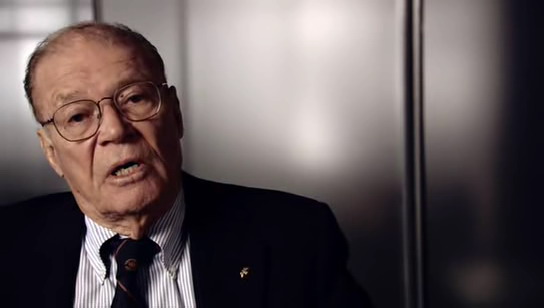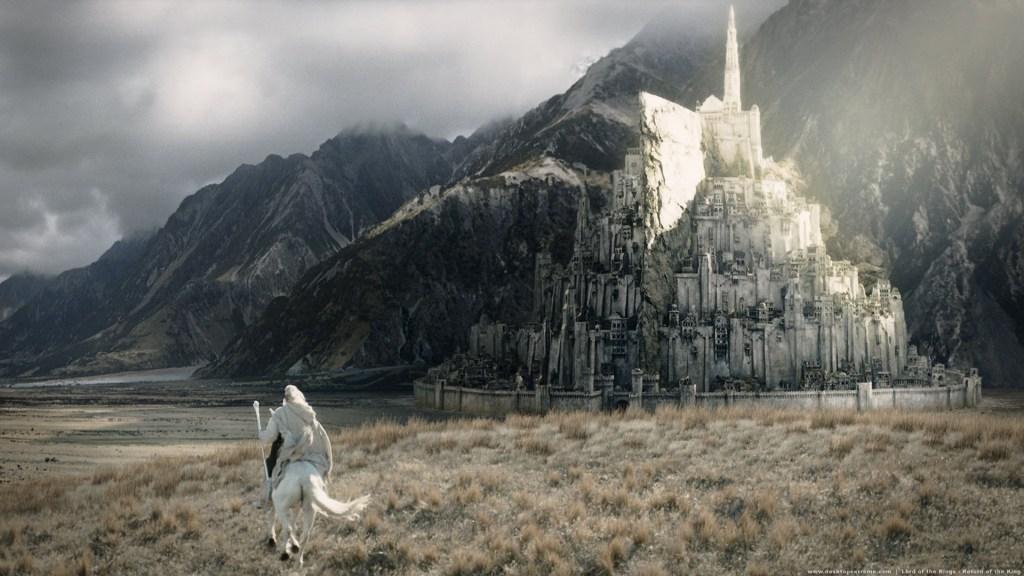
Wow. If you haven’t seen
Return of the King yet, go now. If you have seen it, see it again…There’s so much going on that the film, as great as it is the first time, improves vastly with a second viewing. The rest of this post is going to be full of huge, major spoilers, so if you haven’t seen the movie yet, come back here in three hours and twenty minutes, give or take.
I went into my second viewing of RotK knowing I already liked it better than TTT (which I also thought was superb) and wondering if it was better or just equal to FotR. By the end, I had decided the question was moot. On one hand, Fellowship and King are two very different films: the former a road-trip, men-on-a-mission travelogue of Middle Earth, the latter a full-on, apocalyptic war movie. On the other hand, Fellowship, Towers and King are the same movie, the three chapters of what has to be considered the best ten-hour film ever made.
So, in short, I loved it. As in the past two years, my inordinately high expectations were met, even surpassed. Of course, I had some problems with the film (which I’ll get to in a bit), but I’d be doing PJ & co. a great disservice if I didn’t make it emphatically clear that the positives far outweigh the negatives. In that spirit, some of the stuff I really liked:
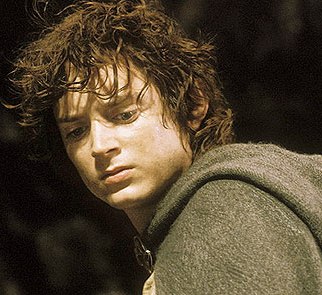 Fear and Loathing in Minas Tirith: I thought one of the biggest surprises of RotK was seeing PJ’s background in horror films come to the fore. To take just one example, one of my major concerns going in was that Shelob wouldn’t seem qualitatively different from your average Kong-sized monster (for example, the Watcher in the Water in Fellowship.) After building Her Ladyship up since the end of Towers, it was crucial that She seem more ancient and malevolent than anything Frodo and Sam had yet faced, with the possible exception of the Balrog. And, while I think her lair was too brightly lit (there’s not much point in having the light of Earendil if we can already see around the place), Shelob seemed just as cunning and dastardly as I’d hoped. (It was also a nice touch for PJ to have a little fun wth the purists, and make it seem Frodo had escaped.)
Fear and Loathing in Minas Tirith: I thought one of the biggest surprises of RotK was seeing PJ’s background in horror films come to the fore. To take just one example, one of my major concerns going in was that Shelob wouldn’t seem qualitatively different from your average Kong-sized monster (for example, the Watcher in the Water in Fellowship.) After building Her Ladyship up since the end of Towers, it was crucial that She seem more ancient and malevolent than anything Frodo and Sam had yet faced, with the possible exception of the Balrog. And, while I think her lair was too brightly lit (there’s not much point in having the light of Earendil if we can already see around the place), Shelob seemed just as cunning and dastardly as I’d hoped. (It was also a nice touch for PJ to have a little fun wth the purists, and make it seem Frodo had escaped.)
From cascading heads to Grond to the pyre of Denethor to everything having to do with Minas Morgul and the Witch-King, PJ’s horror maven cred was put to great effect in Rotk and greatly enhanced the apocalyptic dread necessary to make the third book work. In fact, I thought Jackson made a great decision to place one of the most chilling moments in the movie right at the beginning. “We even forgot our own name…”
The Tides of War: Another concern I had going in was that Jackson would short-shrift Tolkien’s characters in favor of long, drawn-out, and indistinguishable battle sequences. And, while some might think this is in fact the case (no Houses of Healing, for example), I was surprised by how engaging the battle scenes turned out. When you think about it, Pelennor Fields is written a lot like Helm’s Deep…a siege that, just when all seems hopeless, is turned by the arrival of the cavalry. But it is to Jackson’s credit that I not only found myself enthralled by the ever-changing course of combat but also oblivious to the memory of Helm’s Deep. There are plenty of searing images herein — the Ride of the Rohirrim (made sublime by the return of Howard Shore’s Rohan theme), the chunks of masonry flung from Minas Tirith, the berserker trolls leading the charge at the gate, the Nazgul air support diving down over the White City like Stuka bombers. Speaking of which, there’s a shot of a fell beast lunging for the head of one of Faramir’s retreating Gondorians that made me swing my head out of the way both times.
High Fidelity: One of the main reasons why I found RotK more enticing than TTT (other than the obvious plot resolution here) is that it seemed a return to Tolkien’s vision after the warg attack/Helm’s Deep-wallowing of TTT. (There are some notable exceptions, of course, which I’ll get to in a bit.) In particular, the Professor’s inimitable turns of phrase breathe through many more scenes here: “Did you think the eyes of the White Tower were blind?” “No tomb for Denethor and Faramir. No long, slow sleep of death embalmed. We will burn like the heathen kings of old.” “Come not between the Nazgul and his prey!” “Don’t go where I can’t follow.” “We set out to save the Shire, Sam, and it has been saved, but not for me.” Towers has its share of great Tolkien moments too, of course, but — as in Fellowship — I was continually reminded during King of how great the original books are, and how unique and absorbing Tolkien’s deliberately archaic prose can be.
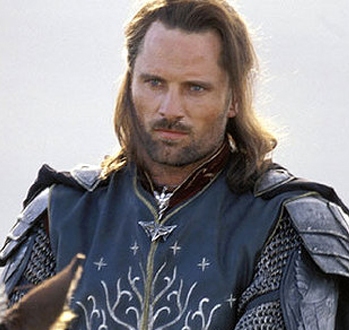 The Crack of Doom and Beyond: “I’m glad you’re with me, Samwise Gamgee, here at the end of all things.” And, of course, there’s the payoff. While I thought Frodo and Sam hopped and skipped across Mordor entirely too quickly (I expect this will be rectified in the EE), I thought the failure of Frodo at the Sammath Naur was dramatized just about perfectly, right down to the evil smile on Frodo’s face and Gollum’s ecstatic Superbowl dance. As for the “too many endings” issue that seems to be a focal point of the criticism, I did feel it went on a bit long the first time (perhaps because it was nearing 3:30am by then), but thought it was paced very nicely the second time around. And, though the Scouring of the Shire (while critical to Tolkien’s narrative arc) seems justifiably expendable here, the film just couldn’t do without the Grey Havens. In fact, if anything, I thought Frodo should have been more recognizably damaged at the end of the film. He seemed all smiles at the Green Dragon and Sam’s wedding, which to me is something of a problem…I figured the idea, as befitting Tolkien’s “Lost Generation,” was that he never really made it back, and I don’t think this is emphasized enough in the film. Still, for the most part, I thought Jackson handled the resolution quite well, paying homage to the arch-Christian overtones of Frodo’s death and rebirth without necessarily wallowing in them.
The Crack of Doom and Beyond: “I’m glad you’re with me, Samwise Gamgee, here at the end of all things.” And, of course, there’s the payoff. While I thought Frodo and Sam hopped and skipped across Mordor entirely too quickly (I expect this will be rectified in the EE), I thought the failure of Frodo at the Sammath Naur was dramatized just about perfectly, right down to the evil smile on Frodo’s face and Gollum’s ecstatic Superbowl dance. As for the “too many endings” issue that seems to be a focal point of the criticism, I did feel it went on a bit long the first time (perhaps because it was nearing 3:30am by then), but thought it was paced very nicely the second time around. And, though the Scouring of the Shire (while critical to Tolkien’s narrative arc) seems justifiably expendable here, the film just couldn’t do without the Grey Havens. In fact, if anything, I thought Frodo should have been more recognizably damaged at the end of the film. He seemed all smiles at the Green Dragon and Sam’s wedding, which to me is something of a problem…I figured the idea, as befitting Tolkien’s “Lost Generation,” was that he never really made it back, and I don’t think this is emphasized enough in the film. Still, for the most part, I thought Jackson handled the resolution quite well, paying homage to the arch-Christian overtones of Frodo’s death and rebirth without necessarily wallowing in them.
Miscellany: The categories above just can’t do justice to all the moments and flourishes I loved about RotK. All of Smeagol/Gollum’s scenes were top-notch, even the film-added-framing of the fat one. I loved the dressing of the witch-king and his sonic scream atop Minas Morgul. The lighting of the beacons was great. Theoden seemed like he was missing a scene (he goes from anti-Gondor to pro-Gondor too quickly), but Bernard Hill was a standout (along with Billy Boyd’s Pippen and Sean Astin’s Sam…heck, everyone was good, except for a few minor players.) Minas Tirith was a marvel (and, unlike the too-small Edoras, seemed like a capital city.) Merry and Pippen at the gate of Isengard. “In fact, it’s probably best if you don’t speak at all, Peregrin Took.” Peter Jackson dolled up as a Corsair Captain. LotR: Return of the Moth. The angelic eagles come to rescue Frodo…
Well, I could go on for awhile here, but perhaps it’s time to accentuate the negative a bit.
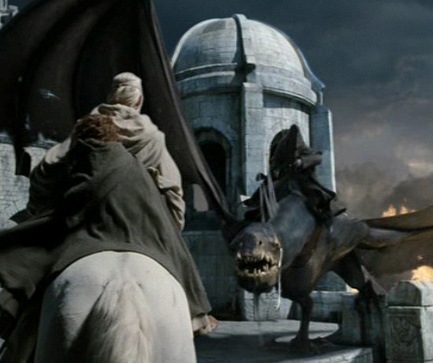 Editing/Pacing: In the theatrical Fellowship, only one scene seemed cut all to hell, and that was Lothlorien. Here in Return of the King, though, the movie keeps eliding over cut moments in a way that can be seriously distracting. I’m not going to harp on this too much, because I expect a lot of this will be solved by the Extended Edition. But, still, it was clear here more than ever before that we weren’t seeing the whole story. How did Theoden change his mind about coming to Gondor’s aid? Why does Denethor talk about the “eyes of the White Tower” without showing his palantir? (For that matter, does Aragorn challenge Sauron in the palantir?) Why does the Witch-King claim he will “break” the white wizard without confronting him? (It was even in the trailer!) Why set up a head orc like Gothmog (Slothmog, the Elephant Man) and not show him killed? Where were the Easterlings (whom Frodo and Sam saw entering the Black Gate in TTT)? Why do Sam and Frodo get in and out of orc armor? How do they cross Mordor in a day? What happened to Eowyn and Faramir? Where was the Mouth of Sauron? Who’s wearing the three Elven Rings?
Editing/Pacing: In the theatrical Fellowship, only one scene seemed cut all to hell, and that was Lothlorien. Here in Return of the King, though, the movie keeps eliding over cut moments in a way that can be seriously distracting. I’m not going to harp on this too much, because I expect a lot of this will be solved by the Extended Edition. But, still, it was clear here more than ever before that we weren’t seeing the whole story. How did Theoden change his mind about coming to Gondor’s aid? Why does Denethor talk about the “eyes of the White Tower” without showing his palantir? (For that matter, does Aragorn challenge Sauron in the palantir?) Why does the Witch-King claim he will “break” the white wizard without confronting him? (It was even in the trailer!) Why set up a head orc like Gothmog (Slothmog, the Elephant Man) and not show him killed? Where were the Easterlings (whom Frodo and Sam saw entering the Black Gate in TTT)? Why do Sam and Frodo get in and out of orc armor? How do they cross Mordor in a day? What happened to Eowyn and Faramir? Where was the Mouth of Sauron? Who’s wearing the three Elven Rings?
And so on and so on. I know PJ has to make some cuts for the theatrical version (although some might say that he’d have more time here if not for the warg attack/Aragorn’s fall in TTT), and some of the cuts — Voice of Saruman, the Scouring — just make cinematic sense. But others not only seem integral to Tolkien’s book but also integral to the story Jackson is telling here (particularly Denethor and the palantir.) Speaking of which…
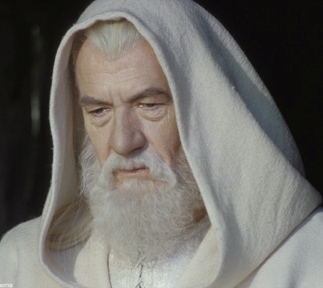 The Steward of Gondor: I’m not going to complain too much about what’s not in the film until I’ve seen the EE. But, as for what’s actually in the film, Denethor is the biggest problem. I’ve never really been bothered about the changes made to Faramir (or, as the purist wags refer to him, Filmamir/Farfromthebookamir) in TTT…they heightened his dramatic arc. But I think Denethor kinda gets screwed here, and only in part because of the lack of palantir. John Noble is surprisingly good as the Steward, and does a great job with what he’s been given. But the single worst moment in the movie for me is Gandalf clocking Denethor to take over command of the White City. It’s goofy, it’s slapstick, and it cheapens both characters (Is all of Gondor really just going to stand around and let Gandalf exercise what is now basically a coup?) Similarly, I thought the pyre of Denethor was handled quite well until the last few moments, when Gandalf/Shadowfax kick Denethor to his doom!! That’s completely botched…Gandalf was trying to prevent Denethor’s suicide, but here he acts like the wizard Kevorkian. If the palantir is reintroduced in the EE, some of this is forgiven, but still…those two choices are the only times I was taken out of the film.
The Steward of Gondor: I’m not going to complain too much about what’s not in the film until I’ve seen the EE. But, as for what’s actually in the film, Denethor is the biggest problem. I’ve never really been bothered about the changes made to Faramir (or, as the purist wags refer to him, Filmamir/Farfromthebookamir) in TTT…they heightened his dramatic arc. But I think Denethor kinda gets screwed here, and only in part because of the lack of palantir. John Noble is surprisingly good as the Steward, and does a great job with what he’s been given. But the single worst moment in the movie for me is Gandalf clocking Denethor to take over command of the White City. It’s goofy, it’s slapstick, and it cheapens both characters (Is all of Gondor really just going to stand around and let Gandalf exercise what is now basically a coup?) Similarly, I thought the pyre of Denethor was handled quite well until the last few moments, when Gandalf/Shadowfax kick Denethor to his doom!! That’s completely botched…Gandalf was trying to prevent Denethor’s suicide, but here he acts like the wizard Kevorkian. If the palantir is reintroduced in the EE, some of this is forgiven, but still…those two choices are the only times I was taken out of the film.
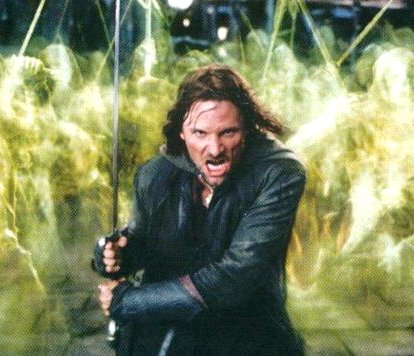 Miscellany: Not much in this department. I thought the whole Paths/Army of the Dead subplot was a deus ex machina and, as others have noted, Haunted Mansion goofy…but, y’know, that’s also a problem with Tolkien’s book. (I did like Stephen Hunter’s take on ’em here, though.) Very occasionally, one of the minor players came off like community theater (I’m thinking particularly of Shagrat (or is it Gorbag?), the orc who explains that the Shelob-stung Frodo isn’t dead.) As in TTT, we seem to spend a lot of time in Osgiliath, and perhaps some of it is unnecessary given the other cuts. Hugo Weaving has a Father of the Bride simper on his face at the coronation that’s completely un-Elrond-like. Um, yes, Legolas, we are talking about a diversion. Etc. etc.
Miscellany: Not much in this department. I thought the whole Paths/Army of the Dead subplot was a deus ex machina and, as others have noted, Haunted Mansion goofy…but, y’know, that’s also a problem with Tolkien’s book. (I did like Stephen Hunter’s take on ’em here, though.) Very occasionally, one of the minor players came off like community theater (I’m thinking particularly of Shagrat (or is it Gorbag?), the orc who explains that the Shelob-stung Frodo isn’t dead.) As in TTT, we seem to spend a lot of time in Osgiliath, and perhaps some of it is unnecessary given the other cuts. Hugo Weaving has a Father of the Bride simper on his face at the coronation that’s completely un-Elrond-like. Um, yes, Legolas, we are talking about a diversion. Etc. etc.
But let’s not miss Fangorn for the Huorns. Return of the King is an amazing conclusion to a trilogy that’s surpassed all expectations and, I say this without hyperbole, redefined the medium — From the technical breakthrough of Gollum to the seamless intertwining of jaw-dropping FX and character-driven emotion throughout, these films have expanded our vision of the possible and set a new standard for epic filmmaking, one left by the wayside since the days of David Lean. I am eternally thankful to Peter Jackson, Fran Walsh, Phillipa Boyens, Alan Lee, John Howe, Richard Taylor, Barrie Osborne, Andrew Lesnie, and everyone else involved in The Lord of the Rings for making these films as good as they are. When so many eagerly-awaited movies have proven disappointments, perhaps none so glaring as the Star Wars prequels, it’s a beautiful thing that these films came along, surpassed even my extremely high expectations, and restored to me the type of cinematic thrill I once feared I might have grown out of. In sum, Fellowship of the Ring, The Two Towers, and Return of the King — inarguably the best fantasy trilogy in the history of cinema — are a priceless gift not only to filmgoers and fantasy readers but to the memory and words of J.R.R. Tolkien himself, and it is one I will love and cherish until the end of my days.
It’s funny, though. I expected to suffer from some form of fanboy post-partum after seeing The Return of the King. But, in fact, I’m thrilled…I can now go see this movie any time I want to. And then there’s the Extended Edition to look forward to in November, and perhaps, some day in the not-so-distant future, The Hobbit (Being the tale of Bilbo Baggins and the Finding of the Ring of Power) will make the screen. Even after the end of all things, the road goes ever on.
